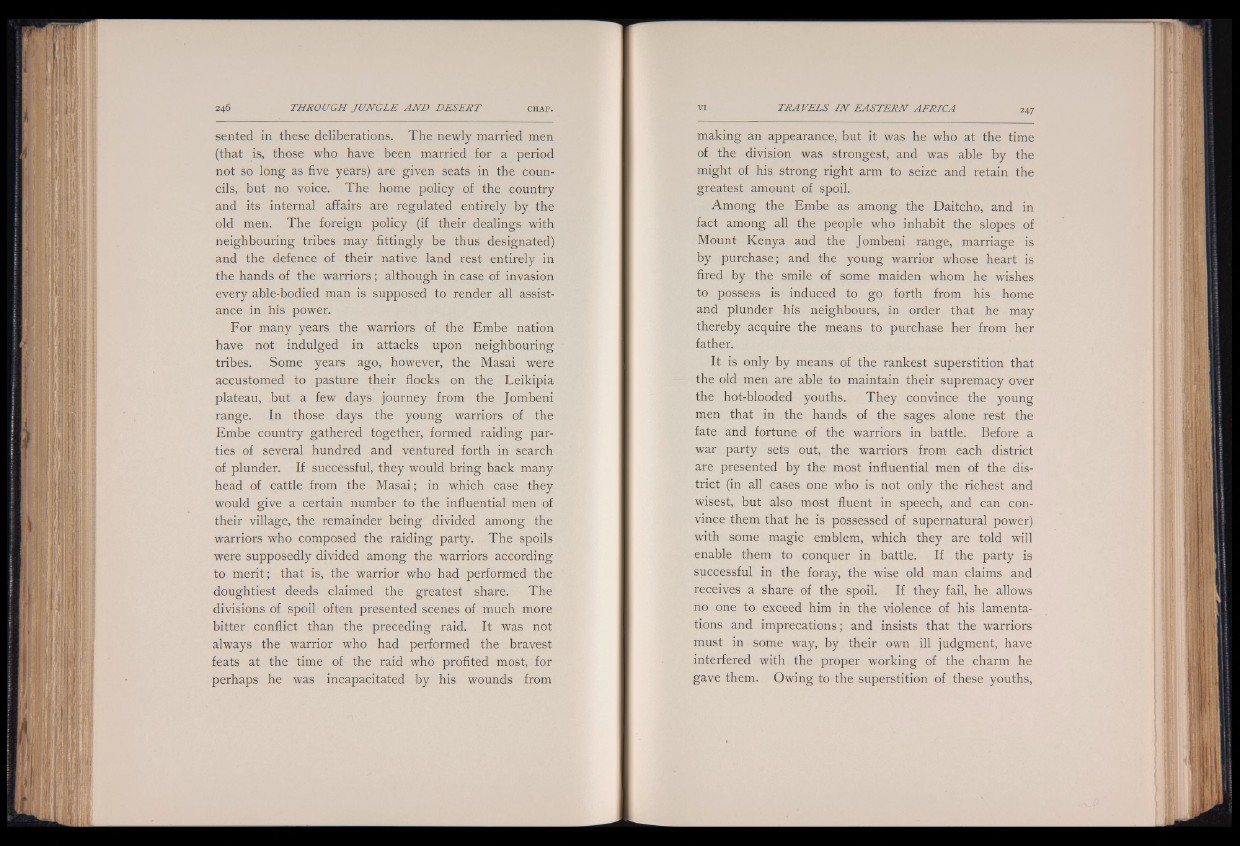
sented in these deliberations. The newly married men
(that is, those who have been married for a period
not so long as five years) are given seats in the councils,
but no voice. The home policy of the country
and its internal affairs are regulated entirely by the
old men. The foreign policy (if their dealings with
neighbouring tribes may fittingly be thus designated)
and the defence of their native land rest entirely in
the hands of the warriors; although in case of invasion
every able-bodied man is supposed to render all assistance
in his power.
For many years the warriors of the Embe nation
have not indulged in attacks upon neighbouring
tribes. Some years ago, however, the Masai were
accustomed to pasture their flocks on the Leikipia
plateau, but a few days journey from the Jombeni
range. In those days the young warriors of the
Embe country gathered together, formed raiding parties
of several hundred and ventured forth in search
of plunder. If successful, they would bring back many
head of cattle from the Masai; in which case they
would give a certain number to the influential men of
their village, the remainder being divided among the
warriors who composed the raiding party. The spoils
were supposedly divided among the warriors according
to merit; that is, the warrior who had performed the
doughtiest deeds claimed the greatest share. The
divisions of spoil often presented scenes of much more
bitter conflict than the preceding raid. It was not
always the warrior who had performed the bravest
feats at the time of the raid who profited most, for
perhaps he was incapacitated by his wounds from
making an appearance, but it was he who at the time
of the division was strongest, and was able by the
might of his strong right arm to seize and retain the
greatest amount of spoil.
Among the Embe as among the Daitcho, and in
fact among all the people who inhabit the slopes of
Mount Kenya and the Jombeni range, marriage is
by purchase; and the young warrior whose heart is
fired by the smile of some maiden whom he wishes
to possess is induced to go forth from his home
and plunder his neighbours, in order that he may
thereby acquire the means to purchase her from her
father.
It is only by means of the rankest superstition that
the old men are able to maintain their supremacy over
the hot-blooded youths. They convince the young
men that in the hands of the sages alone rest the
fate and fortune of the warriors in battle. Before a
war party sets out, the warriors from each district
are presented by the most influential men of the district
(in all cases one who is not only the richest and
wisest,, but also most fluent in speech, and can convince
them that he is possessed of supernatural power)
with some magic emblem, which they are told will
enable them to conquer in battle. If the party is
successful in the foray, the wise old man claims and
receives a share of the spoil. If they fail, he allows
no one to exceed him in the. violence of his lamentations
and imprecations; and insists that the warriors
must in some way, by their own ill judgment, have
interfered with the proper working of the charm he
gave them. Owing to the superstition of these youths,